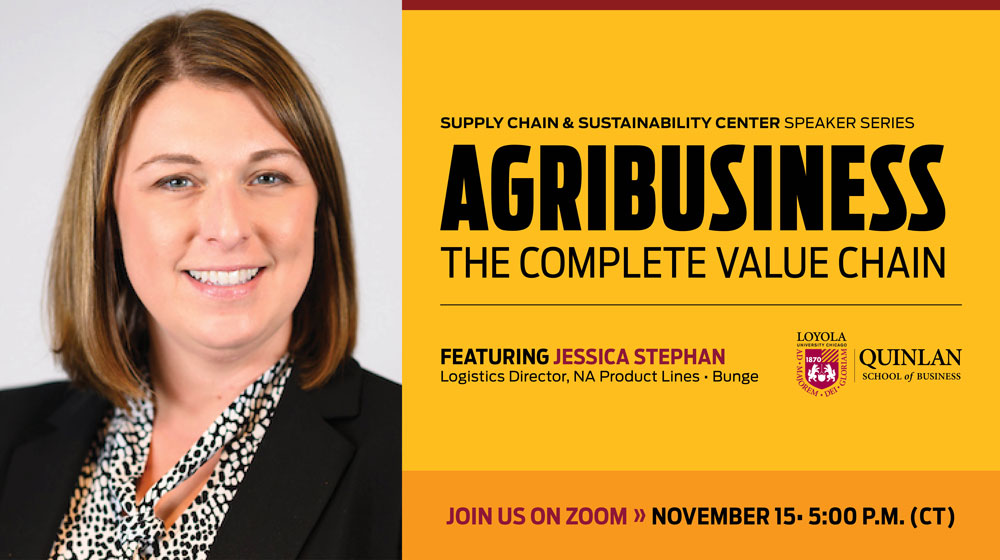Loyola University > Supply Chain and Sustainability Center > Events > Past Events > archive
archive
Agribusiness: The Complete Value Chain

Agriculture is one of the most valuable tools we can use to feed a projected 10 billion people by 2050. According to the World Economic Forum, food, agriculture, land and ocean systems are the backbones of society, providing the sustenance that is essential to life, and central to the global economy, representing $10 trillion (12% of global GDP) and 40% of all jobs. In the US, the USDA estimates agriculture, food, and related industries contributed roughly $1.264 trillion to U.S. gross domestic product (GDP) in 2021. In 2022, 22.1 million full- and part-time jobs were related to the agricultural and food sectors.
Agribusiness is the complete value chain in agriculture, from the raw materials and resources needed to create biological products, to distributors and retailers that get products to end consumers. There are 4 links in agribusiness chain, each adding value to the output of the previous: input providers < producers < processors < other service providers. Transportation binds these links together, with every mode that touches a road, river, rail line, or ocean involved in transporting goods from producers to consumers. Companies in agribusiness face unprecedented challenges daily, ranging from environmental condition changes to geopolitical issues and shifts in consumer supply and demand. For companies like Bunge whose base purpose is to create and supply agricultural products for end-consumption, effective and efficient supply chain management is key to ensuring the agribusiness links stay connected.
This session provided an overview of the agribusiness industry allowing attendees to gain a better understanding of how commodities like corn, soybeans and wheat move from field to market in the US and around the world. Additional topics included a deep dive into transportation, with emphasis on learning more about how rivers and barges are vital to US and global supply chains.
Event details & registration
Date: Wednesday, November 15, 2023
Time: 5:00 - 6:00 p.m. (CT)
Format: Zoom
About Jessica
Jessica Stephan is Logistics Director for Bunge, a global agribusiness leader in delivering food, feed, and fuel to customers around the world. She is responsible for overseeing bulk barge and vessel logistics for the company’s North American agribusiness division and serves as product line director for US and Canada domestic transportation. Additionally, Jessica is a member of the company’s Global Logistics team working to align commodity flows, manage costs, maintain port capacity contracts, standardize internal processes, and develop logistics talent across the globe.
After joining the company in 2008, Jessica held several merchandising and trading positions prior to switching career paths to supply chain and logistics in 2013. Jessica’s breadth of experience has made her one of the company’s logistics experts on several large and mega-size capital expenditure project teams for inland, port, and oilseed crush facilities. She has extensive knowledge and experience with commercial trade rules and practices, contracting and service agreements, and serves the industry as an arbitrator for trade disputes.
Currently, Jessica is Chair of National Grain and Feed Association’s Waterborne Commerce Committee, Co-Chair of North American Export Grain Association’s Contracts Committee and is a board of directors member for Waterways Council Inc. She is also a board of directors member for Operation Food Search, a St. Louis-based non-profit organization dedicated to ending hunger in the greater metropolitan area, and is on the advisory board of the Washington University Boeing Center for Supply Chain Innovation.
Jessica graduated from Illinois State University with a B.S. in Agriculture Education and a M.S. in Agribusiness. She is based out of Bunge’s global headquarters in Chesterfield, MO and lives in Wildwood with her husband, Patrick, and their two daughters, Dylan and Alex.